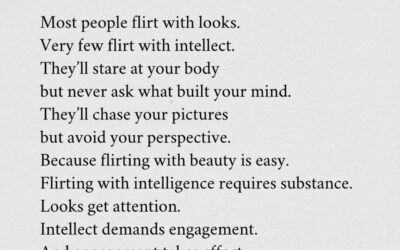We’re curating ourselves into mannequins.
We’ve gotten so good at pretending that the performance now feels like the person. Polished outrage, curated humility, compassion with a call‑to‑action button. The timeline scrolls like a city of mannequins rehearsing sincerity, smooth faces, sharper takes while anything unedited lands like static. It’s funny: we keep saying we want authenticity, but when it shows up late, messy, unphotogenic, we flinch because it threatens the character we’ve been playing.
What if the algorithm isn’t some external tyrant but a mirror trained on our cravings? It feeds certainty because we reward it. It suppresses nuance because we abandon it. We say truth matters, but truth is slow, and slow is expensive. So we rent shortcuts. We outsource conviction to consensus. We mistake applause for evidence.
Here’s a different bet: let impact be the thing that outlasts the post. Ask whether the last thing you published would embarrass you in ten years if it aged without the likes attached. Ask whether your silence today protects your comfort or protects someone else’s future. Ask whether your “brand” can survive you telling the truth when it’s not profitable. If the answer scares you, that’s the vein worth pressing.
Maybe the rebellion is truer stakes. Say the thing that makes the room go quiet and then stay long enough to hold the echo. Choose being useful over being viral. Trade the immaculate surface for a visible spine. The crowd can keep score; you can keep faith.
If society feels fake, remember it’s not a machine, just a million small choices braided together. That means rot scales, but so does repair.
Start where you actually have jurisdiction: your next sentence, your next no, your next yes with terms.
Let the metrics catch up. Or don’t. Either way, walk out of the costume and into the consequence.




0 Comments